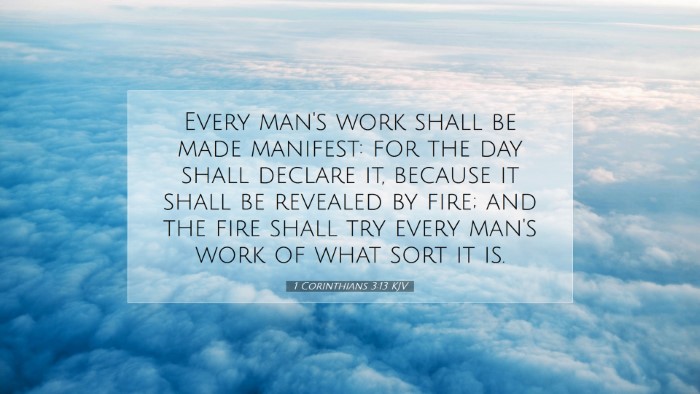1 Corinthians 3:13
"Each one’s work will become manifest, for the Day will disclose it, because it will be revealed by fire, and the fire will test what sort of work each one has done."
Commentary Overview
This verse emphasizes the ultimate testing of Christian works on the Day of Judgment. The Apostle Paul, addressing the Corinthian church, affirms that each believer's labor in Christ will be evaluated, revealing their true quality and nature. This examination is not merely a casual review but a profound and fiery assessment that brings the hidden nuances of each believer's service to light.
Insights from Matthew Henry
Henry underscores the significance of each individual's efforts in God’s kingdom. He cautions that while works may appear impressive on the surface, they will be scrutinized accurately by Christ. All motives and methods will be laid bare; hence the emphasis on sincerity and faithfulness in ministry is paramount. Henry states:
- The Day of Judgment: The "Day" referenced is a metaphor for the Day of the Lord, a time when God will fully reveal the true nature of every work done in His name.
- The Test of Fire: This imagery of fire symbolizes purification, signifying that only those works which are genuine and built upon a solid foundation will endure the examination of God's holiness.
- Motives Matter: Believers need to be aware of their motivations; works done out of self-interest or vanity will inevitably be revealed and judged accordingly.
Insights from Albert Barnes
Barnes elaborates on the concept of each one’s "work" and its temporary nature. He discusses how the "fire" serves as both a trial and a purging process. Barnes comments:
- The Manifestation of Works: He indicates that each work done in the body will be exposed in its true light, and this exposure will include all good, bad, and indifferent works.
- The Nature of Rewards or Loss: Barnes asserts that while true believers will be saved, they may suffer loss for their unworthy works. This points to the reality that not all believers will have equal rewards.
- The Assurance of Judgment: He reminds readers that judgment is certain and should cultivate within believers a sense of urgency to live meaningfully for the Lord.
Insights from Adam Clarke
Clarke provides a detailed analysis of the context in which Paul writes this passage. He emphasizes the following points:
- Congregational Context: Clarke notes that Paul is addressing divisions within the Corinthian church, indicating that even amidst their quarrels, each person's contributions to the community’s spiritual structure are vital.
- The Fire's Purity: He describes the fire as not destructive for the righteous, but rather as a means of purifying the good while discarding the faulty materials.
- Encouragement to Build Wisely: Clarke urges believers to build upon the foundation of Jesus Christ with "gold, silver, precious stones," rather than "wood, hay, stubble," underscoring the importance of quality over quantity.
Theological Implications
This verse invites deeper theological reflection on the nature of salvation and the concept of works. The implications for pastors, students, and scholars include:
- Faith vs. Works: 1 Corinthians 3:13 highlights the relationship between faith and works, positing that faith is the foundation, but works are the evidence of that faith.
- Judgment for Believers: While believers are not judged for sin in the same way as non-believers, they are held accountable for their actions and the loyalty of their service to Christ.
- Doctrine of Rewards: This passage augments the theological understanding of rewards in heaven; it generates motivation for believers to pursue holiness and faithfulness.
Application for Modern Believers
Practical applications from 1 Corinthians 3:13 for contemporary readers include:
- Self-Examination: Believers are encouraged to regularly evaluate their motives and methods in ministry to ensure that they align with God’s purpose.
- Faithfulness in Service: A commitment to serve diligently with the right intentions is paramount; each act should be viewed in light of eternity.
- Building with Intent: This scripture challenges believers to be intentional about what they contribute to the church and to the broader mission of Christ, aiming for works that are eternally relevant.
Conclusion
1 Corinthians 3:13 serves as a sobering reminder of the reality of divine judgment but also as an encouragement toward constructive and intentional Christian living. Through the insights from Matthew Henry, Albert Barnes, and Adam Clarke, we can understand the need for authenticity in our service and the transformative opportunity we have to produce work that brings glory to God and endures the test of fire.


